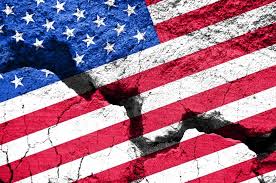American Trauma
An American history textbook published in 2050 might call the first quarter of the 21st Century “Time of Trauma.”
“Trauma” explains a lot about our politics today.
It started with 9/11, a shocking attack on the homeland.
Briefly, we rallied and came together.
Then we embarked on two misguided, misbegotten and ill-fated overseas wars that traumatized us – and divided us – for 20 years.
Politics grew bitter.
Then came the financial collapse of 2008 and the Great Recession. Millions of Americans still haven’t recovered.
Through all these years, millions of Americans suffered from trade deals and trickledown economics, while they saw the privileged prosper.
Then came the election of a Black President, which inspired millions of Americans and unhinged millions of others.
Politics grew more bitter, divided and angry.
Then came Trump, who has thrived on and deepened the anger, divisions and bitterness.
Then came Covid, which drove us into separate camps: masked versus unmasked, vaxxed versus antivaxxers.
Now come divisions over Israel’s war in Gaza, Russia’s war in Ukraine and the threat of China.
On top of all that are polarizing battles over race, abortion, guns, climate change, health care, LGBTQ rights, schools, immigration, trade, taxes, economics, global relations and you name it.
Then there are the opioid and fentanyl crises. And crises of despair, depression and mental heath.
The collective trauma drives us into separate camps, suspicious of and hostile to each other.
Will the history texts of 2050 recount our recovery – or our descent into darkness?
Will government even allow an honest recounting of history in 2050?
For 250 years, our nation has overcome trauma and division. Somehow, despite all our faults and failings, the American people and the American system have always triumphed.
Let’s not be the ones who fail.

American Trauma

An American history textbook published in 2050 might call the first quarter of the 21st Century “Time of Trauma.”
“Trauma” explains a lot about our politics today.
It started with 9/11, a shocking attack on the homeland.
Briefly, we rallied and came together.
Then we embarked on two misguided, misbegotten and ill-fated overseas wars that traumatized us – and divided us – for 20 years.
Politics grew bitter.
Then came the financial collapse of 2008 and the Great Recession. Millions of Americans still haven’t recovered.
Through all these years, millions of Americans suffered from trade deals and trickledown economics, while they saw the privileged prosper.
Then came the election of a Black President, which inspired millions of Americans and unhinged millions of others.
Politics grew more bitter, divided and angry.
Then came Trump, who has thrived on and deepened the anger, divisions and bitterness.
Then came Covid, which drove us into separate camps: masked versus unmasked, vaxxed versus antivaxxers.
Now come divisions over Israel’s war in Gaza, Russia’s war in Ukraine and the threat of China.
On top of all that are polarizing battles over race, abortion, guns, climate change, health care, LGBTQ rights, schools, immigration, trade, taxes, economics, global relations and you name it.
Then there are the opioid and fentanyl crises. And crises of despair, depression and mental heath.
The collective trauma drives us into separate camps, suspicious of and hostile to each other.
Will the history texts of 2050 recount our recovery – or our descent into darkness?
Will government even allow an honest recounting of history in 2050?
For 250 years, our nation has overcome trauma and division. Somehow, despite all our faults and failings, the American people and the American system have always triumphed.
Let’s not be the ones who fail.